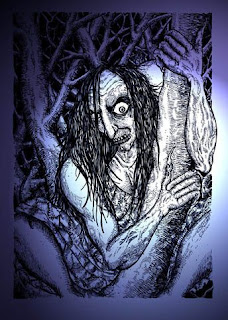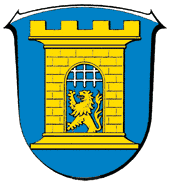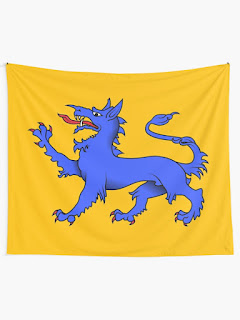 |
| A trow dancing the Henking |
|
|
Frequency: rare
No appearing: 1-8
Armour Class: 5
Move: 90' (30')
Hit Dice: 3 +3
% in Lair: 50%
Treasure Type: C
No of Attacks: 3
Damage/Attack: 1-4/1-4/1-6
Special Attacks: cause disease
Special Defence: teleportation
Magic Resistance: standard
Intelligence: low
Alignment: Chaotic Evil
Size: S (5' tall)
morale: 7
The Trow, which is a variety of bogle and a relative of the troll, is a gnarled, little night monster that delights in kidnapping human children and inflicting disease.
They are active only during the night, when they sneak silently about looking for mischief. The Trow has excellent infravision (90') and a very acute sense of smell, which allows it to detect invisible creatures without fail.
These bogles will normally sneak into a home, kidnap any children present, and infest the rest of the family with disease. This ability takes the form of a
cause disease spell, which a Trow may cast once per day. If Trow is surprised, it will do its best to escape and return to its subterranean home. If cornered, it will fight its way out with its claws (1-4 dmg) and teeth (1-6 dmg). Similar to the troll, the Trow is able to regenerate lost hit points at the rate of one per round.
The Trow live in secret, underground lairs, the entrances to which are hidden and only accessible by a
teleport spell, which the may cast twice per day. If a Trow does not return to its lair by daybreak, it will turn into an old, gray hag and must wander about until darkness, when it may
teleport home. In this state it loses all claw attacks, and its HP are reduced to half.
The Trow usually dwell near remote, wilderness settlements, but large numbers are occasionally known to inflect cities. They are thieving cowards outside their lairs, but very aggressive when inside them. Their social organisation is loosely tribal. These bogles enjoy feasting on the boiled flesh of young humans (they find adults too tough) and can often be seen dancing their bizarre, lopsided dance, called the 'Henking', on moonlight moors.
The Trow dress in whatever rags they can find. Their long, unkempt hair is dark and greasy, while their skin is dry and gray. They have small, beady eyes, large noses and ears, an over-sized head and hands.
















